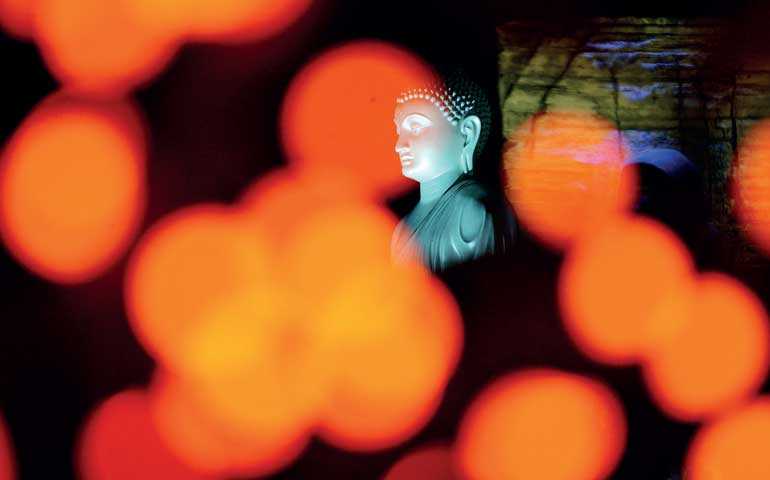Friday Apr 19, 2024
Friday Apr 19, 2024
Thursday, 8 August 2019 00:37 - - {{hitsCtrl.values.hits}}

If we take Buddhism as a way of life, while its philosophical ideals and the ultimate objective of Nibbana and emancipation need to be heeded as its end goal, one cannot ignore the social, economic and political welfare of the people. A society has to be at peace within it and a state of social and societal equilibrium must exist, and this state needs to be reached through a better understanding of each other and with loving kindness towards each other – Pic by Shehan Gunasekara
We like to say that that Buddhism is a way of life and that there are no barriers to anyone being a Buddhist. In fact, the Buddha would have endorsed something that Bishop Duleep Chickera, former Bishop of Colombo, said recently about him having multiple identities and that he is a Christian, a Buddhist and a Socialist at the same time. Unfortunately, the actual practice amongst many who profess to be Buddhists appear to be tribal and the opposite of it being open to anyone and everyone. For many, it has become a label and an outer garment one wears to be seen as part of a tribe.
If we take Buddhism as a way of life, while its philosophical ideals and the ultimate objective of Nibbana and emancipation need to be heeded as its end goal, one cannot ignore the social, economic and political welfare of the people. A society has to be at peace within it and a state of social and societal equilibrium must exist, and this state needs to be reached through a better understanding of each other and with loving kindness towards each other. 
The Buddha epitomised loving kindness (metta) and compassion (karuna) towards all beings and was greatly interested in the happiness of not only the mankind but of all other beings as well. To him happiness was not possible without leading a pure life based on moral, ethical and spiritual conduct. He firmly believed that such a life was possible only under favourable material, social and political conditions. He considered such conditions as a means to a higher and nobler end.
In Kutadanda Sutta (Digha Nikaya) Buddha explains that in order to eradicate crime, the economic condition of the people should be improved. The relationship between the employer and the employee should be made cordial mainly by the payment of adequate wages, gifts and incentives. The kings (governments) should take this fact into serious consideration and keep the people happy and contented, so that consequently, the country would be peaceful and crime free.
Not only did the Buddha teach non-violence and peace; he also personally intervened in quelling disputes in the field of battle through His sublime Dhamma. For instance, He intervened in the case of a friction between the Sakyas and the Koliyas and prevented a deadly war. Again, King Ajatasattu who was about to wage war against the Vajjis was prevented from doing so, entirely on the valuable advice of the Buddha. Further, our chronicles (Mahavamsa and Dipavamsa) say that the Buddha visited Sri Lanka on three occasions, and having suppressed certain disputes through the Dhamma, established peace in the country.
Therefore, we see that while the Buddha put across His philosophy successfully, he also advocated the maintenance of peace and cordiality throughout, which was absolutely essential for spiritual development. He had shown how a country could become corrupt and unhappy when the heads of its government become corrupt and unjust. For a country to be happy, it must have a good and just government. How this form of just government is evolved is detailed in his recommendations entitled ‘Ten Royal Virtues’. (‘Dasa-Raja Dhamma’ – Jataka Text).
The ‘Ten Royal Virtues’
Dana: liberality, generosity or charity. The giving away of alms to the needy. It is the duty of the king (government) to look after the welfare of his needy subjects. The ideal ruler should give away wealth and property wisely without giving in-to craving and attachment. In other words, he should not try to be rich making use of his position.
Sila: morality – a high moral character. He must observe at least the Five Precepts, and conduct himself both in private and in public life as to be a shining example to his subjects. This virtue is very important, because, if the ruler adheres to it, strictly, then bribery and corruption, violence and indiscipline would be automatically wiped out in the country.
Comfort Pariccaga: Making sacrifices if they are for the good of the people - personal name and fame; even the life if need be. By the grant of gifts, etc. the ruler spurs the subjects on to more efficient and more loyal service.
Ajjava: Honesty and integrity. He must be absolutely straightforward and must never take recourse to any crooked or doubtful means to achieve his ends. He must be free from fear or favour in the discharge of his duties.
Maddava: Kindness or gentleness. A ruler’s uprightness may sometimes require firmness. But this should be tempered with kindness and gentleness. In other words, a ruler should not be over – harsh or cruel.
Tapa: Restraint of senses and austerity in habits. Shunning indulgence in sensual pleasures, an ideal monarch keeps his five senses under control. Some rulers may, using their position, flout moral conduct - this is not becoming of a good monarch.
The premise that there are no permanent friends or enemies in politics will be clearly evident in the coming months. Alliances will be formed, deals done and one time enemies will hug each other, and friends will fall out with each other. Promises will be made and every possible measure taken to anaesthetise the voters with dreams of prosperity and opportunity. On this occasion however, whoever who wins the Presidential Election will have the opportunity of dragging the country away from the precipice of despair and hopelessness it is now in. More than ever, the country is in need a true leader who would at least abide by some if not all the principles of just governance enunciated in the universal truths in the Dasa Raja Dharma tenants and usher in some degree of morality, ethics, honesty and integrity to a country sadly lacking in all of these
Akkodha: Non-hatred. The ruler should bear no grudge against anybody. Without harbouring grievances, he must act with forbearance and love.
Avihimsa: non-violence. Not only should he refrain from harming anybody but he should also try to promote peace and prevent war, when necessary. He must practice non-violence to the highest possible extent so long as it does not interfere with the firmness expected of an ideal ruler.
Khanti: Patience and tolerance. Without losing his temper, the ruler should be able to bear up hardships and insults. In any occasion he should be able to conduct himself without giving in-to emotions. He should be able to receive both bouquets and brickbats in the same spirit and with equanimity.
Avirodha: Non-opposition and non-enmity. The ruler should not oppose the will of the people. He must cultivate the spirit of amity among his subjects. In other words, he should rule in harmony with his people.
The Buddha in his dispensations has emphasised the fact that the nature of the subjects depends largely on the behaviour of their rulers. Therefore, for the good of the people at large He set out these Ten Royal Virtues – ‘Dasa-Raja-Dhamma’ to be practiced by the rulers of men.
After the advent of Buddha Sasana to Sri Lanka, in the reign of King Devanampiya Tissa, in the 3rd century B.C, the long line of Buddhist Kings would have kept to ‘Dasa-Raja — Dhamma’ in fostering good governance.
An area in Danister Fernando’s article that may be disputed is his statement about India’s foreign policy being based on the ‘Five Principles’ or ‘Pancasila’ (which is itself a Buddhist term) being in accordance with Buddhist principles and Dharmasoka, the great Buddhist Emperor of India, who was contemporary and a good friend of King Devanampiya Tissa of Lanka applying Buddhist principles to his administration as evidenced in his Rock Edicts available in India and seen even today.
Fernando also cites Thailand – where the Theravada concept of Buddhism is in practice and where His Majesty the King is loved by all and held in very high esteem with deep respect. His Majesty, seated on the ‘Bhadrabith Throne’ beneath the ‘Nine-Tiered White Umbrella of States’ in the ‘Baisal Daksin Hall’ of the Grand Palace, had pronounced the ancient oath of accession to the Throne, which says, “I will reign with righteousness, for the benefits and happiness of the people”. The word ‘righteousness’ is the key, as it leads back in time through over 2,500 years of history to the Buddhist concept of Kingship. The ideal monarch is expected to abide by the ‘Tenfold Moral Principles’ of the Sovereign, ‘Tossapit Rajatham’ in Thai, which in our Jataka Text are called ‘Dasa-Raja — Dhamma’. (From a paper published in connection with the birth anniversary of His Majesty, King of Thailand.).
It may be argued that these traditions are as contestable as the Sri Lankan lofty political catch phrases such as ‘Dharmishta Samajaya’ or ‘Yahapalanaya,’ which political leaders took to the people as election slogans, and after winning the elections, practiced virtually the opposite.
While it is not the intention here to argue the pros and cons of what India and Thailand profess to uphold and what they actually do, the Sri Lankan experience is fresh in the minds of many, and they are able to determine whether political leaders have been successful in ushering a Dharmishta society or a just society through Yahapalanaya.
It is election time in Sri Lanka and no doubt, at the oncoming Presidential Election, aspirants will come up with their political catch phrases. It is unlikely anyone will travel down the path of the failed Dharmishta Samajaya or Yahapalanaya phrases.
Instead of taking any notice of lofty ideals promised before elections and never delivered after elections, it will be good if the voters would assess each aspirant’s actual adherence to the principles enunciated in the Dasa Raja Dharma, either in their political life or their life before politics when they cast their vote.
The Dasa Raja Dharma principles should be applied to the aspirants in their individual capacity as well as how they have influenced the actual practices in society. No doubt, voters should also consider whether the policies that aspirants present are consistent with the principles enunciated in the Dasa Raja Dharma.
What might be these principles in contemporary times? How would aspirants to the highest office in the country rule consistent with these age old universal truths, the ethical and moral, and human principles?
The premise that there are no permanent friends or enemies in politics will be clearly evident in the coming months. Alliances will be formed, deals done and one time enemies will hug each other, and friends will fall out with each other. Promises will be made and every possible measure taken to anaesthetise the voters with dreams of prosperity and opportunity. On this occasion however, whoever who wins the Presidential Election will have the opportunity of dragging the country away from the precipice of despair and hopelessness it is now in. More than ever, the country is in need a true leader who would at least abide by some if not all the principles of just governance enunciated in the universal truths in the Dasa Raja Dharma tenants and usher in some degree of morality, ethics, honesty and integrity to a country sadly lacking in all of these.
(This article is based on one written by Danister I. Fernando and which appeared on www.Virtual Library-Sri Lanka.)